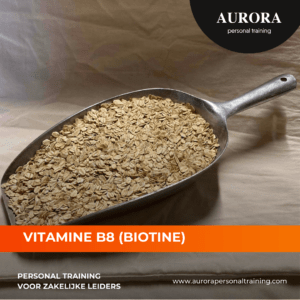The importance of Vitamin B8
The importance of Vitamin B8, also known as biotin, plays a crucial role in releasing energy from food and promotes skin and hair health. Discover the essential functions, nutritional sources and possible uses of vitamin B8.
Main functions of Vitamin B8
- Glucose conversion:
- Vitamin B8 contains an enzyme that plays a key role in the conversion of glucose, which is essential for maintaining constant blood sugar levels.
- Fatty acids and omega3 fatty acids:
- Essential for the conversion of linoleic acid into omega3 fatty acids, which is vital for a healthy body.
Dietary Sources of Vitamin B8
Get vitamin B8 from foods such as eggs, liver, milk, nuts and peanuts. Find out the amount of biotin in different foods to ensure you get enough.| Nutrient | Quantity | Micrograms |
|---|---|---|
| Liver (calf) | 100g | 75 |
| Soybeans | 100g | 60 |
| Wheat bran | 50g | 22 |
| Oat flakes | 100g | 20 |
| Portobello mushrooms, | 100g | 16 |
| Egg (Medium) | - | 12 |
| Milk (full) | 1 dl | 3,5 |
Causes of Vitamin B8 deficiency:
- Medicines:
- Some medicines, including antibiotics, can inhibit the action of vitamin B8.
- Pregnancy:
- The need for vitamin B8 increases during pregnancy and breastfeeding.
Applications of Vitamin B8:
- Diabetes Support:
- Biotin can support the action of insulin.
- Skin and hair health:
- Extra vitamin B8 can be beneficial for hair loss, brittle nails and dry flaky skin.
Consequences of a disturbed biotin balance:
Are you experiencing reduced growth, hair loss, changes in mood or red, flaky skin around the nose and mouth? These may be signs of a disturbed biotin balance.Daily amount:
Although no specific recommended daily allowance has been established for men and women, getting enough biotin is essential to maintain optimal health and vitality. Discover today how vitamin B8 can play a key role in promoting your energy and well-being!